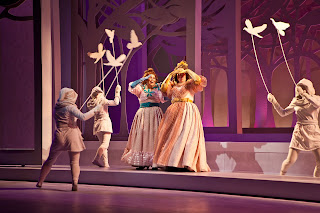The
Connections
In Guillermo del Toro's
film, Pan's Labyrinth, the journey of a young girl, Ofelia,
during post civil war times. After her father's death, her mother remarries
Captain Vidal, a vicious man guided by no moral compass, only a loyalty to
Franco's lead and a desire to preserve his family name through a son. Life with
the Captain is unbearable. Ofelia turns to a fairy tale world as a way for
escape. In this world, there are parallels to the real world as well as the
Grimm Brothers' Aschenputtel. As I summarized that tale in the
previous blog, I won't be doing that here- rather I will be focusing on it's
connection to Pan's Labyrinth.
The first comparison is
in the loss of the mother in both tales. In Aschenputtel, the
father is still alive, but does not do anything to protect or care for
Aschenputtel. In this way both protagonists are left in the care of a step
parent that has no regard for their well being.
The rule
of three is a staple of many fairy tales, is a strong characteristic of these
tales as well. In the film, Ofelia must complete three tasks. One of which she
feeds a large toad three stones in order to obtain a key, and in the second
task she must decide which of three doors has the dagger she must acquire from
a monster's layer. All of these tasks are leading to the reuniting of the
trinity that is the royalty of the underworld (The King, Queen, and
Princess Mona aka Ofelia). In Aschenputtel, the feast lasts
three days, Aschenputtel wears three different gowns, and after her two step
sisters tried on the golden slipper (third times the charm), the prince finds
his partner. While the rule of threes isn't an Aschenputtel specific
trait, both fairy tales utilize this.
The role of the fairy tales
In Pan’s Labyrinth, the fairy tale idea is
a powerful tool. Not only did it bring in a common story that has been told by
many cultures in different ways. Fairy tales provide a beautiful and artistic
way of illustrating life lessons, and about the progression from childhood into
adulthood. In this film, the fairy tale world works as an escape from reality
for the character of Ofelia. And although it is an escape, the fairy tale world
mirrors the real world that Ofelia is struggling with. This tale shows the
harshness of this time period on childhood innocence. The character of Mercedes
mirrors Ofelia and her journey through the fairy tale realm (the task of retrieving
the key for the storage shed, the knife she kept on her and used against the
captain).This provided an additional message, that in the real world innocence
doesn’t prevail. Those more hardened by reality survive. By the use of fairy
tale, we can compare what is needed for survival, and see the value of purity
of spirit.





No comments:
Post a Comment